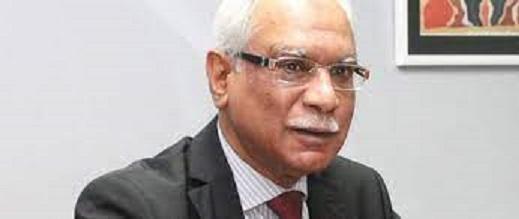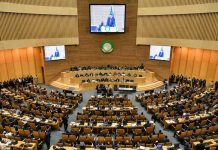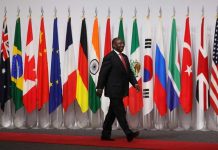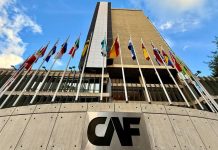
Africa-Press – Mauritius. We will know by November 4 if the government alliance will present a candidate during the partial set for December 17. If the leaders of the MSM-ML tandem decide to abstain, we do not see how this election will mark a turning point in the history of the country, as argued by Arvin Boolell in a recent interview – except to demonstrate the weight of the different parties of opposition on the chessboard, in the absence of a target.
What do you think ? Cader Sayed-Hossen: It is a mistake to think that the issue of the partial in Quatre-Bornes boils down to a simple exercise in measuring the strength of the various opposition parties in Mauritius.
Non-participation in elections is also an indication of political strength: in this case, a negative indication, a refusal to measure up, a certainty of sanction from the electorate and the refusal to take the sanction such as a slap in the face, a confession of weakness.
The Labor Party in power or in opposition has always participated in a partial when there has been one. We have never fled, neither from our responsibilities nor from the electorate.
The results of this by-election in Quatre-Bornes will indeed mark a turning point in the history of the country: they will announce and confirm the decline and the end of the worst regime that our country has known in its entire history – a regime with several characteristics: incompetence, the rape of democracy, public immorality and the most abject pettiness of some elected officials of this Government, widespread corruption.
There are also cases of the looting of public funds by those close to those in power, lying and bluffing erected into a mode of governance, the collapse and decay of most of our institutions, privileges, the disappearance of public order, the most chaotic I don’t care, in short, a regime that has become a nightmare for the country.
We have our candidate for this election, Arvin Boolell, and we will win this election hands down because the Nation, including the electorate of Quatre-Bornes, knows that the Labor Party is the only political force which represents a credible alternation in the national catastrophe that is the Jugnauth regime.
But, beyond that, it is the refusal of the Alliance Lepep to face the electorate which is the most convincing factor in our current history. The non-participation of the Alliance Lepep in this election is, in itself, an announced and admitted defeat – and this is what marks a turning point in the contemporary history of the country.
* It is probably the PTr which, more than the others, bets big in a partial at No. 18, a victory which could create a certain dynamic for the next legislative elections, but also to demonstrate that those who “fired” in 2014 have actually “returned” to the party.
What do you think ? Obviously, we are betting on this partial, and as you say – and everyone knows – the dynamics that our certain victory will generate will precipitate the fall of the Jugnauth regime.
Indeed, a considerable part of our electorate had changed course in 2014 for various reasons, among others, the rejection of our alliance with the MMM, the refusal of the project of the second Republic, the lure of the false electoral promises of the Lepep alliance .
And we have been witnessing for more than two years a reversal of this electorate, disappointed and disillusioned and having very quickly realized that it would have been the victim of liars, charlatans and voracious looters of public property.
The electorate is disappointed with the men and women who govern us today. We see ourselves the turnaround of this electorate in all the ridings, in rural areas as well as in urban areas. But in politics, simple observation, even empirical, is not enough.
Demonstration and confirmation through facts and action are more important and, indeed, the Quatre-Bornes partial will provide us with the opportunity to confirm what we are already seeing throughout the country, namely the announced return of Labor Party at Government House.
* Candidate Boolell will be able to count on the helping hand of leader Ramgoolam, the same one who said recently: “If mo pa lor terrain, PTr na pa wins election”.
So, if we understand correctly, the victory is him; the defeat will also be his. That’s it ? Candidate Boolell, as you say, is not Boolell’s candidate but the Labor Party’s candidate.
And Navin Ramgoolam is the leader of the Labor Party. The party, the leader, the candidate: from these three factors, the equation therefore automatically falls into place.
The leader of the party will obviously campaign for the victory of his candidate and his party. He will enter the electoral campaign when the time comes. No one can doubt the mobilizing power of Navin Ramgoolam and the very considerable pull factor he represents.
And obviously, the Labor Party cannot win an election, this one or another, without Navin Ramgoolam, its leader, without his personal commitment and without his presence on the ground, whatever the dreamers and detractors may think.
Arvin Boolell is an experienced, reputable, credible and accredited politician. But, let’s be realistic and honest: despite his undeniable qualities, he is not an independent candidate but that of the Labor Party.
There is not only all the historical burden that this represents, but above all, all the hope for a better future for the country and for our children. This is offered by the Labor alternation.
The victory will obviously be that of the Labor Party and Arvin Boolell, but above all that of its leader, Navin Ramgoolam, whose strength and charisma will lead us to victory.
And if there is a defeat – a scenario that we do not envisage at all of course – Navin Ramgoolam will not hesitate for a second to admit his responsibility, as he did the day after our defeat in the 2014 elections.
D Moreover, he had even immediately offered his resignation as leader of the party – an offer of resignation which had been unanimously rejected by the Politburo of the Labor Party.
* The PMSD has great ambitions: its secretary general maintains that “the by-election will position the PMSD as the largest party in the next legislative elections with Xavier Duval as future Prime Minister”.
Can’t wait for the competition coming from the “natural ally” of the PTr. . . If I were mean, I would answer you that it is allowed to dream with your eyes open with shoes too big for your little feet, even if it is legitimate to have ambitions.
The PMSD is a small family party bringing together dad, son, cousin, nephews and others, plus a few outsiders who are the extras on duty. And it cannot aspire to become a great party of national scope.
The PMSD has never won elections without an alliance with a major party and has always strove for an alliance to be part of a government majority – which it almost always hastily abandoned when it felt the wind turn.
The concept of “natural ally” is an invention of a journalist or historian and does not bind either the PTr or the PMSD. Admittedly, the PMSD is an adversary for us during the partial Quatre-Bornes and represents a competition in the same way as the MMM, the MP and the other parties presenting a candidate in this election.
But at the national level, we certainly do not see the PMSD as competing with us to become the majority national party. Moreover, we do not believe that Xavier Duval is remotely capable of competing with Navin Ramgoolam for the post of Prime Minister.
* If we rely on social networks, interventions on private radio stations and in the written press, the Government’s popularity rating would be at its lowest.
Are these not misleading signs, you say, as they were in the run-up to December 2014? Expressions of government unpopularity are not limited to the media you mention.
This unpopularity constantly screams in everyday life, every day, whenever the opportunity arises, in practically every conversation. The leitmotif is: it’s time for them to leave, it’s time for a general election, it’s time for a change.
However, current data and data prior to December 2014 are fundamentally different. Everyone knows that it took us a long time to understand the reasons for our defeat in December 2014.
In addition, I must admit that some of the party also took a long time to understand the reasons for our unpopularity during this period. At least it took me a while to figure it out.
Before December 2014, we had in Navin Ramgoolam a Prime Minister chosen and elected by the people to be Prime Minister, not a daddy’s boy awaiting a judgment from the Privy Council.
The latter was designated by his dad to occupy the chair as if it were a family heirloom. There was consistency in the government policy of Navin Ramgoolam and cohesion in the government team.
Our management of the affairs of the country was excellent, we were running the economy, the growth was good. Investments flowed in, the most vulnerable among us were protected.
The country was modernizing at a pace never seen before. None of our ministers was subservient to any other country, neither to Saudi Arabia nor to any other.
Our diplomacy was clear, coherent and constructive. In the government of Navin Ramgoolam before December 2014, none of our deputies and ministers had been involved in questionable transactions.
.
. We do not insult anyone, and especially not women. We did not treat any journalist as a Lisien female. None of our ministers wrote letters of recommendation for the benefit of repeat offenders.
None of our MPs photographed either their wagging tongue or their sex inside or outside Parliament and then WhatsApp said photos to a girl, and so on.
We had neither a Soodhun, nor a Yerrigadoo, nor a Rutnah, nor a Tarolah, nor the multiplicity of other deputies whose misdeeds are far too long to discuss in this interview. At the rate things are going, one wonders if another MP from the government majority or a minister would not be added to this list every week?
* Do you mean that the Soodhun, Yerrigadoo, Tarolah, Rutnah and others are losing more votes to the Government than any economic success can neutralize? Experience has shown you that this is how defeat is programmed for any government: political morality outweighs economic progress?
To begin with, what economic success are you talking about? Ask the question of economic well-being to captains of industry, entrepreneurs, small, medium and large, traders.
They will all tell you about sluggishness, business closures, government bureaucracy that stifles entrepreneurship. Ask the question to consumers and they will tell you about the immense difficulties of making ends meet and the sorrows of their daily lives.
In three years, the Jugnauth regime has created nothing. On the contrary, it destroys the foundations of our economic prosperity and undermines investor confidence.
Germany under Hitler, from 1933, had made lightning economic advances. But at what cost ? At the cost of a policy that ended up causing 100 million deaths and leading to the almost total destruction of Germany.
Political morality and public ethics are just as important as the proper management of the economy, the maintenance of public order and the protection of vulnerable groups.
All these conditions are not mutually exclusive, because in a democracy, the government is – ultimately – only the repository of the sovereignty of the people. But the sovereignty of the people also includes their dignity.
By definition, the exercise of power – which itself derives from the fact that the people have chosen to vest their sovereignty in a group/party/alliance – also implies the total respect of this dignity.
Do those in power today still need to understand the meaning of words such as dignity and morality? Was it not Sir Anerood Jugnauth who said “morality does not fill the stomach”?
* Would this explain the change in attitude of the leader of the MMM vis-à-vis the Lepep government? After Paul Bérenger’s silence on a number of cases that have dominated the news in recent weeks, he suddenly starts calling the MSM names.
“A rot” he says, so no rapprochement, “neither today, nor tomorrow, nor the day after tomorrow.
.
.
“. What credit do you give to this last position taken by Paul Bérenger? We are used to these perpetual reversals of amorous affection on the part of Paul Bérenger.
We’re also used to hearing the superlatives that usually accompany her expressions of affection or disappointment in affection, aren’t we? But we also know that affection in politics is conditioned by partisan interests.
Perhaps Paul Bérenger’s silence then corresponded to moments of coze cozer with Pravind Jugnauth and that today’s anger is linked to the cessation of coze cozer or the presence of a macadam in the coze cozer between them.
Who knows ? * Okay, but you didn’t answer my question. . . What credit do I give to this last position taken by Paul Bérenger? None. Over the past 17 years, the electoral spectrum has seen the materialization and dissolution of virtually every possible and imaginable permutation and configuration of electoral alliances.
To date, the Labor Party is the only party capable of going to the general elections alone, without an alliance and winning these elections. No other party is in this situation.
If no party contracts an alliance before the elections, the MSM and the PMSD will probably be swept away, the ML, currently part of the government majority, being only a hiccup, will probably disappear and the MMM will probably win a few seats.
in its traditional strongholds, even if the PMSD has pecked considerably in its manger for some time. . . The Labor Party will win, with such a scenario, a comfortable majority.
So what else is left as an alternative to Paul Bérenger? Shouldn’t he one day resume the coze cozer with the MSM and make a 180 degree turn to his affection? And he will once again bring us a justification by a blow of a mysterious surrealist dialectic of which he holds the secret.
* What seems certain is that the “natural” adversaries – the PTr and the MMM – will come face to face during the next legislative elections in 2019 or earlier in case the Prime Minister decides to hold early elections…
Historical rather than natural adversaries, I would say. To find ourselves in front of the MMM alone or in alliance with anyone at the next general elections, that does not impress us at all.
The Jugnauths have done everything, tried everything, even using blackmail as in the Dufry affair, to destroy the Labor Party and above all to destroy Navin Ramgoolam – the only obstacle to the perpetuation of the power of the MSM.
Arbitrary arrests, repeated appearances before a police force enslaved to the Jugnauths, ten provisional charges lodged against him – which all fell one after the other,… But Navin Ramgoolam is still there, present and the only possible alternative to the post of Prime Minister.
* What do you decode in the implementation of the six-month advanced Negative Income Tax, recent sports awards, etc. Are these indications of a probable participation in the partial?
Any tax measure, involving either a reduction in state revenues or additional disbursements, must be operated in parallel with measures aimed at the creation of wealth – economic growth. Otherwise, it can lead to additional government debt.
When we see that the public debt has gone from 56% to around 68% of GDP in less than three years under this government, we realize how dangerous the hasty and thoughtless introduction of the “Negative Income Tax” can be for the national economy.
The NIT is in itself a laudable objective because it aims a priori at a social transfer for the benefit of vulnerable groups. Although the NIT is an attractive project, it is generally accepted that the management of this system can be very complex – so much so that to my knowledge it has never been implemented, even in economically advances.
No, I don’t think the actions you mention indicate likely partial participation. The awards to athletes, let’s go over it, we have done it dozens of times during our mandates. The NIT project is probably another one of those multiple trial and error by the Jugnauth Government to regain its popularity.
Whatever the outcome of the partial, it remains likely that the MSM-ML Government could always go through with its mandate, and the opposition parties will have to do with it, right?
I believe it was Sir Anerood Jugnauth who said not too long ago that “critique pou moi, li kouma dir dilo lor brede sonze”. Pravind Jugnauth seems to be of the same ilk.
He was not even able to respond as a prime minister should to the criticisms directly addressed to him by the speaker of the Hindu House on the management of his MPs and ministers.
I believe that Pravind Jugnauth is of such intellectual passivity that he is not only almost insensitive to criticism, but he is able to absorb the worst misdeeds of his deputies and his ministers without flinching.
So, unless there is a social explosion, unless his government is destabilized by the resignations of some of his deputies or because of his own condemnation by the Privy Council, I do not see Pravind Jugnauth calling for elections before the legal end of the current mandate.
In democracy, the MSM should present a candidate for the partial of Quatre-Bornes. Failure to do so is tantamount to admitting defeat, or admitting such unpopularity that defeat in the next by-election is likely.
Once again, in a democracy, Pravind Jugnauth should realize that he no longer has the confidence of the population and that the best option for the interest of the country is to go to the polls.
But it would seem that we should count on the MSM to put its own interests before those of the country. In view of this, barring exceptional circumstances, it is likely that the country will have to wait a while longer.
For More News And Analysis About Mauritius Follow Africa-Press






